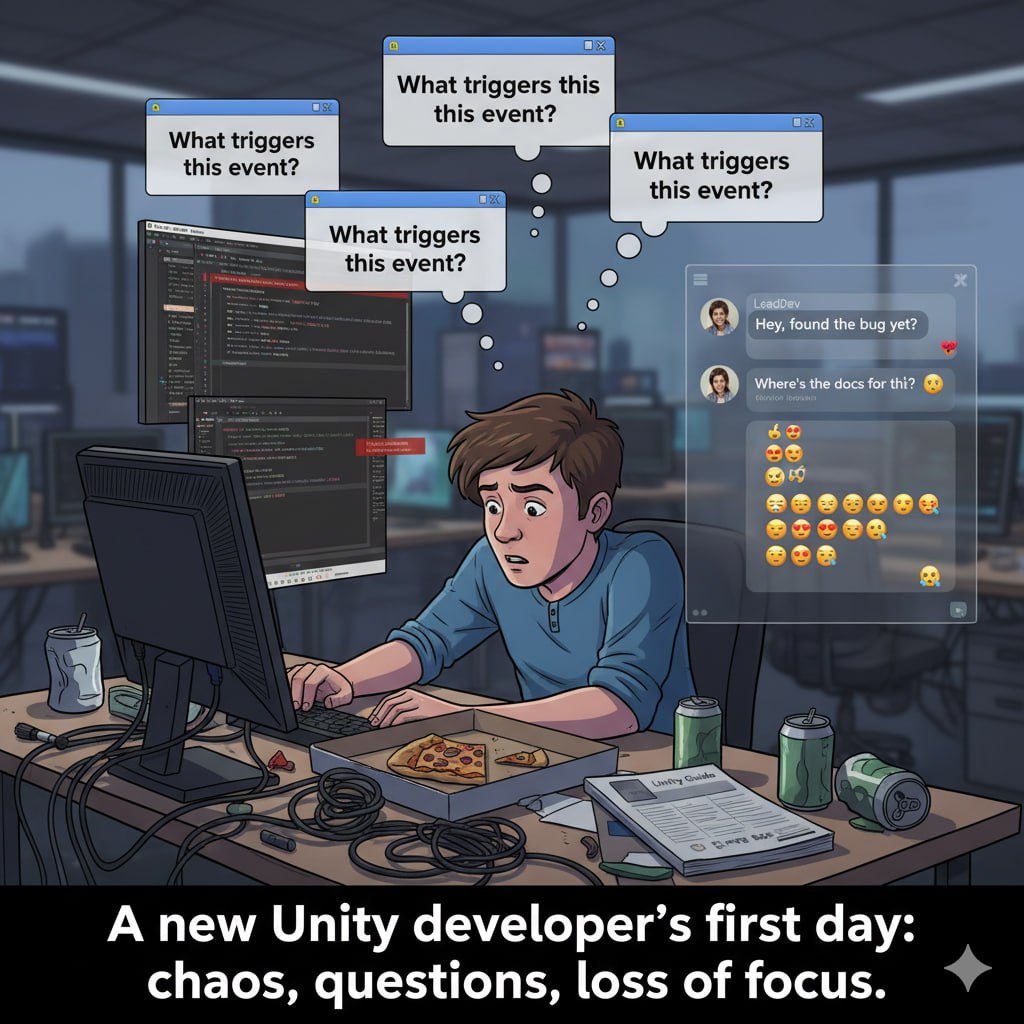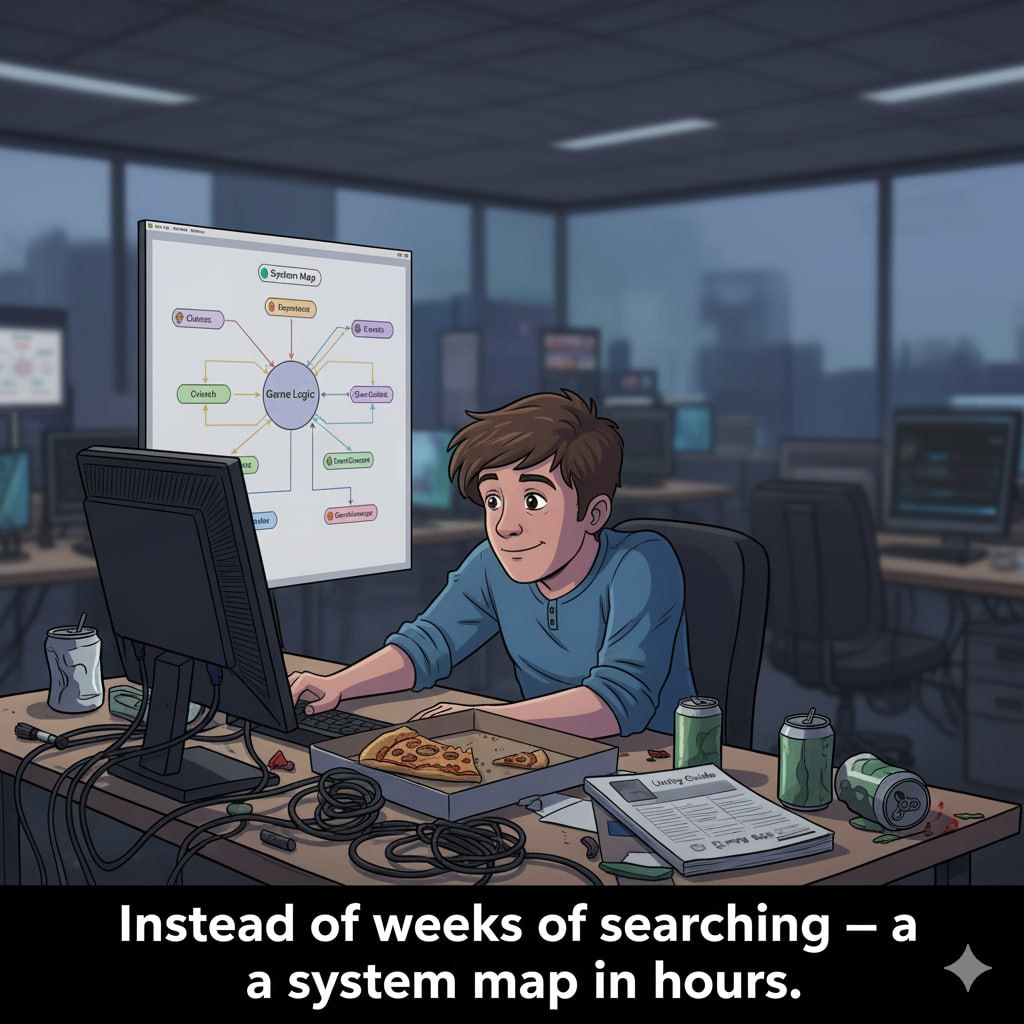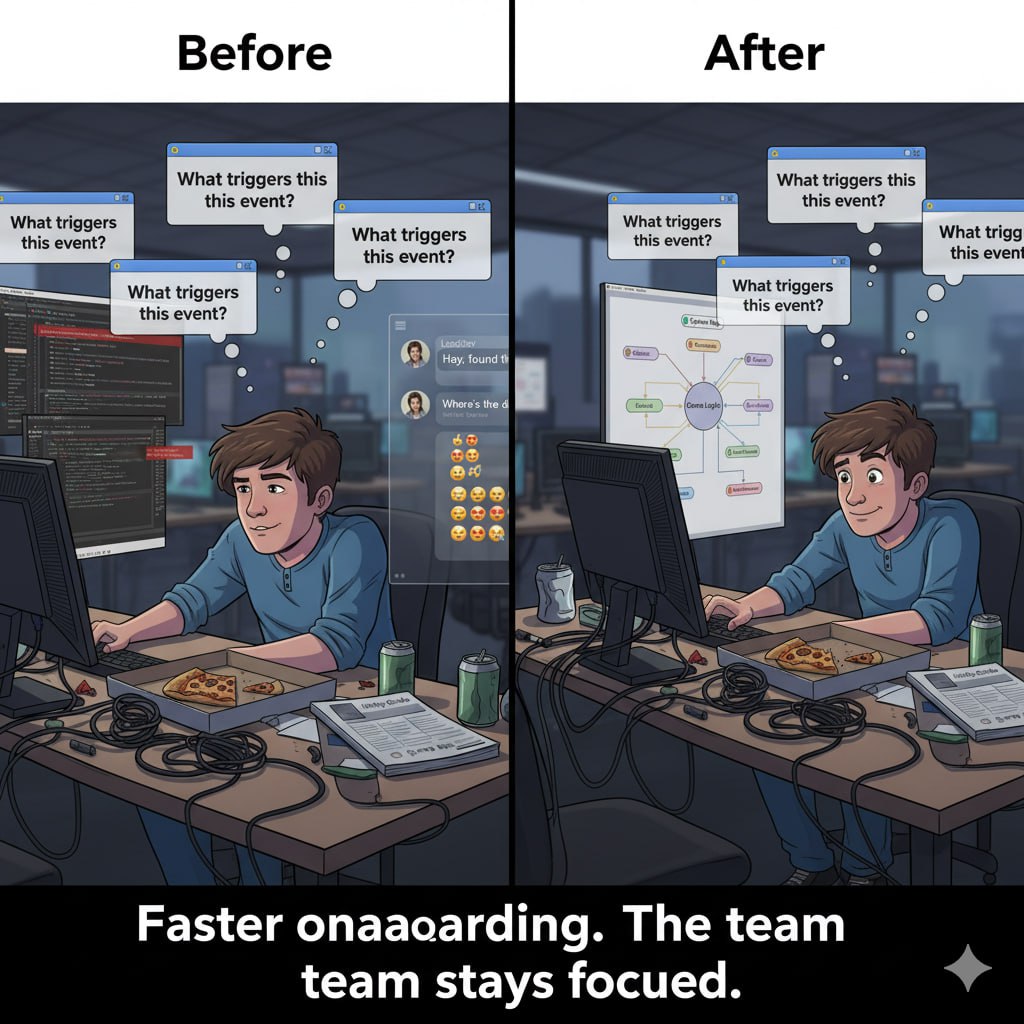The real cost of onboarding a new Unity dev isn’t their salary. It’s the 50+ interruptions they trigger in the first week — every “where’s this class?” or “which scene is it in?” pulling seniors out of focus and slowing the sprint.
Your new dev joins on Monday. By Tuesday, you hope they’re productive.
But in reality? Two weeks disappear into wandering through scripts, asking for explanations, context-switching, and broken momentum. The whole team feels it.
We tried something different. Instead of leaning on a lead to answer every question, we let Code Maestro handle it. The new hire just asked: “Where’s the player progress system?” And instantly saw the relevant classes, dependencies, and scenes — all mapped.
Day one was orientation. Day two — actual commits. It felt weirdly simple.
And here’s the kicker: those “invisible” onboarding costs add up fast. For a studio, it’s not just annoyance — it’s weeks of senior time lost, worth anywhere from a few thousand dollars in small teams to $150K+ annually in large ones.
Curious how much onboarding really costs your team?
Check this out: https://www.code-maestro.com/promo
Did you like this post? Tell us
Leave a comment
Log in with your itch.io account to leave a comment.
A Unity developer needed to test AI bot behavior — different situations, performance, and edge cases. Instead of spending hours on setup, he just asked Code Maestro to help.
CM offered three paths:
A) Full implementation with basic AI behaviors
B) Bare-bone structure to extend later
C) Step-by-step build with approval at each stage
In 15 minutes, the bot was running. After integration, a few Unity console errors appeared. The developer simply asked: “CM, check the console and fix it.” Eight minutes later — everything worked.
It reduces senior workload, scales junior productivity, and cuts delivery time — faster release cycles with fewer bugs and less technical debt.
Code Maestro turns AI into a true teammate — from first script to final build.
Check it here: https://www.code-maestro.com/promo
There’s always that moment mid-sprint when someone asks: “Guys, which scenes are actually included in the Android build?”
And everything stops: someone opens Unity, another checks a config. Yes, fifteen minutes later you have the answer — but also five people who just lost focus.
Code Maestro answers those questions instantly, saving your time and revenue. No digging through settings, no pinging teammates, no breaking the flow. Just quick, quiet clarity that keeps the sprint moving.
Productivity isn’t about doing more — it’s about not losing the rhythm.
Discover the link to stay in focus: https://www.code-maestro.com/promo
Do you know this special kind of silence in the office when someone’s hunting for a piece of code?
Everyone knows — ten files open, search bar blinking, patience running out. Let’s be honest, most of that time isn’t “debugging” — it’s just looking for things.
Now you just ask: “Where’s the inventory logic?” — and Code Maestro points straight to it.
One small change that saves developers’ hours every week quietly turns into faster sprints and fewer missed deadlines, saving for the game studio from $2 500 to $240 000 annually.
We are convinced that real ROI begins when the team stops chasing answers and starts shipping ideas.
Check the link to get your answers: https://www.code-maestro.com/promo
https://www.youtube.com/watch?v=8nIwxu_Ld1s
How much money is your studio quietly losing on onboarding?
Most owners underestimate the hidden costs. Missed sprints, senior time wasted, deadlines slipping — it all adds up.
We built a quick quiz-calculator to show you the real number. It takes 2 minutes — and the results might surprise you.
Find out how much time & revenue you’re losing right now: https://on-board-boss-coins.lovable.app/
Share your result in the comments — let’s compare
That’s 20 hours not spent shipping features. Multiply this by just 5 hires a year, and a mid-size studio quietly burns $50K+ in lost productivity. The issue isn’t talent — it’s process. Knowledge locked in people’s heads slows the entire business. Code Maestro changes the equation. Instead of relying on senior hand-holding, it explains the codebase itself:
The result:
Curious how this could work in your own project? Start your free trial and see how quickly your next hire can start shipping code: https://www.code-maestro.com/promo
Once a new Unity developer joined a studio we’re working with.



Day one looked familiar: digging through scripts, asking “what triggers this event?”, pulling seniors into Slack threads, slowing the sprint.
Normally, that’s two weeks before a single meaningful commit. Multiply it by every new hire in a year — and the studio loses serious money to lost focus and onboarding drag.
This time, we stepped in. He asked: “Where’s the player progress system?” And instead of another Slack thread, the map appeared — classes, events, dependencies, API usages, all linked.
What normally drags on for weeks was solved in hours. And the whole team kept their focus. For the studio, that shift meant less interruption, faster onboarding, and higher output per sprint. Not just speed — real ROI. Studios hit this case dozens of times a year. Each one carries a hidden cost — studios can lose as much as $270K annually just navigating code.
Drop in the comments, what do you think about it — and check the links in the comments.